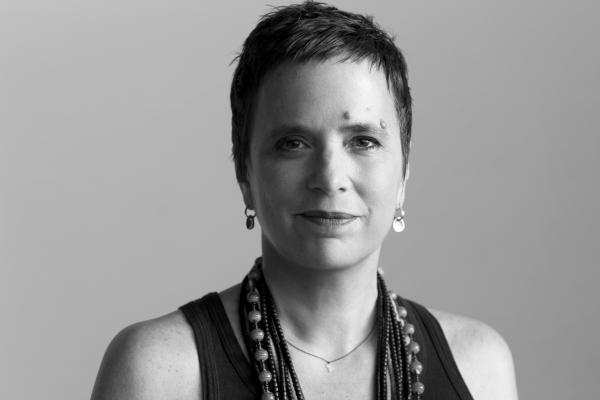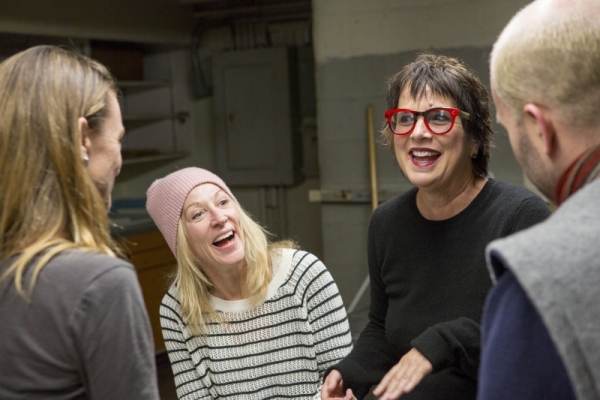Vagina Monologues Playwright Eve Ensler Shifts Her Activist Eye to Freeganism in O.P.C. at the American Repertory Theater
Ensler’s new play may be a comedy, but American waste is no joke.
"Is there anything else you'd like to add before I let you go?" I asked Eve Ensler before wrapping our conversation about her new play, O.P.C. (an enigmatic acronym for "Obsessive Political Correctness"), beginning performances this week at the American Repertory Theater.
"That it's a comedy," she replied. "It's really funny."
With topics like overconsumption, the freegan movement, and the imminent destruction of our planet at the fore of the playwright's new work, the important fact that the show is a comedy is easily overlooked. But anyone who has ever experienced Ensler's world-famous Vagina Monologues is familiar with her talent for balancing earnest issues with playful delivery. Born from that work was V-Day, an annual part of the movement to end violence against women. Only time will tell what kind of political ground O.P.C. will break, but Harvard University's A.R.T. is an apropos ground zero.

(© Brigitte Lacombe)
Without giving too much away, can you tell me what O.P.C. is about?
It's essentially the story of a young woman who drops out of Harvard, who is a freegan and a squatter and living off the grid. She has a very definite, very radical vision of the world. It's really about the conflict that arises when the mother, who is running for the Senate of the United States, wants her to be her senatorial daughter and, quote, "behave during the nine months for her to get in office." It's a play about a family — it's a play about power — it's a play about the very real split in this country that's dividing further and further between what I would call the progressive left and the liberal democrat.
Where did the idea for this play come from?
Having been in this movement for a long time I've really been interested in this divide. I've also been very interested in what happens when you're a person who is actually awake to the world — when you know what’s going on in the world and you know the data and you know the information. How do you survive? I think the play addresses that.
What was your first introduction to freeganism?
I was exposed to freeganism seven or eight years ago. I just was really touched and moved by the freegan movement: people who were changing their lifestyles and changing their politics and realizing that overconsumption and waste were the critical factors in why emissions were rising and why the earth was being destroyed. I went on digs with people in New York where they scavenged New York City for garbage and the amount of garbage that New York City is throwing away on a daily basis. I came home and I wept. I just couldn't believe that we were so wasteful and that we've [developed] a system that is based on that waste. I have great admiration for people who just in their own spirit know they have too much — know that there's plenty there if we just go and resource it. It's not only a very practical movement — the act of doing it shifts your consciousness.
Your plays, most notably The Vagina Monologues, are very socially and politically oriented. Do you write your plays with the intention of inspiring action?
I don't think I wrote The Vagina Monologues for that reason because I didn't even believe I would get beyond downtown, but once it happened and the response was so strong, I realized it could be a tool. We started V-Day almost nineteen years ago and it's become a massive movement. It certainly taught me that theater has a direct line to activism and to changing consciousness.

(© Gretjen Helene)
Do you feel theater has a responsibility to encourage this kind of activism?
I can only speak for right now. I think we're in an utter state of emergency. I don't know how much longer people are going to get to be on the earth. I think the mother's going to have her way with us pretty soon if we don't start respecting this incredible planet that we live on. It's hard for me to go to plays that are not thinking about the world. It's sort of like dancing in the ballroom as the Titanic's going down.
I think all of our attention should be focused on, how are we going to figure this out? Why aren't we encouraging our artists and everyone to be writing things that wake us up and inspire us and give us moral direction?
How have the cast and crew been reacting to the topics presented in the play?
No one can use a plastic cup without apologizing. [laughs] It's amusing at the lunch break to see how people are Tupperware-ing their lunch. It's [also] been so joyous to see the designers really leap into creating and envisioning a world that is recycled and really using found objects and found materials. It's very moving to see people turn around and begin to look at how they are participating in this whole story.








